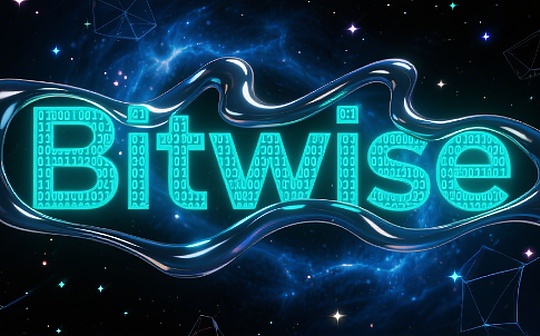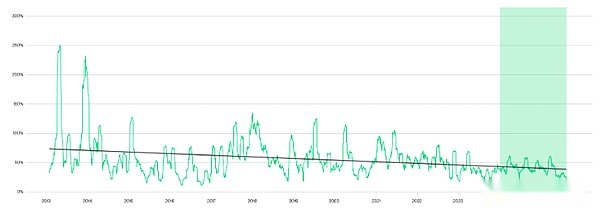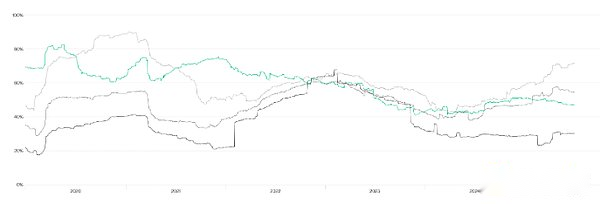
Author: Matt Hougan, Chief Investment Officer of Bitwise; Compiled by: Bitchain Vision
The reasons why people are optimistic about cryptocurrencies are obvious.But the market still ignores some things.
There are a lot of exciting things in the cryptocurrency space right now.Regulation and legislation are moving in a positive direction; stablecoins are booming; corporate purchases of cryptocurrencies are soaring; agencies are slowly but steadily adding cryptocurrencies to their portfolios through ETFs; Ethereum is also reviving, injecting some much-needed altcoin energy into the wider cryptocurrency market.
The problem is—if there is—all of this is well known.I usually think that the market underestimates the scale of these developments, but their occurrence is not unaware.The media is full of reports about the cryptocurrency bull market.
Nevertheless, I think the market will still have significant surprises by the end of this year, enough to push up prices.The following isI think there are four major developments that have not been priced by the market yet.
1. More governments will buy Bitcoin this year
In early 2025, it was generally believed that this year’s demand for Bitcoin will mainly come fromThree major sources: ETFs, enterprises and governments.We call it “Bitcoin Demand Three Knights”.
So far, two of the giants have fulfilled their promises: ETFs have purchased 183,126 BTC, while listed companies have absorbed 354,744 BTC.Considering that the Bitcoin network currently produces only 100,697 BTC, that’s enough to drive its price to rise by 27.1%.
But the Third Knight has not really appeared yet.Granted, the United States has established a strategic Bitcoin reserve, but it only holds Bitcoin through criminal forfeiture.Granted, Pakistan announced its own Bitcoin reserves, and Abu Dhabi has also invested in Bitcoin ETFs, but these are just a drop in the bucket compared to the rapid purchases of ETFs and businesses.
The general view is that the possibility of sovereign states adopting Bitcoin as a reserve asset has disappeared.I suspect this idea is wrong.Countries and central banks are slow to act, but according to our discussions at Bitwise, they are acting.
It should be clear: I don’t think there will be a large number of national announcements before the end of the year, but I do doubt itMore announcements will be available – enough to make it a major potential catalyst for 2026.This alone could push up prices significantly.
2. Weaker USD + lower interest rates = higher Bitcoin
One unique thing about the current situation is that Bitcoin trading prices have reached all-time highs, while interest rates hover around the highest levels since Bitcoin was born in 2009.This shouldn’t have happened.High interest rates pose challenges to non-yield assets such as Bitcoin (and gold) because they set high thresholds for holding these assets.
The market expects interest rate cuts to be cut several times before the end of the year, which should support Bitcoin.But I think the market ignores a more important story.
The Trump administration strongly hopes that the dollar will weaken and the Federal Reserve will be more dovish.From directly criticizing Fed Chairman Jerome Powell to appointing weak dollar advocate Stephen Milan to the Fed’s board of directors, the Trump administration is keenly hinting at the hope of significantly lowering interest rates and weakening the dollar.
It’s not a rate cut three times, six times, or eight times.
Milan’s appointment is particularly worthy of attention.Milan’s most famous paper is that he pointed out that the US dollar’s status as the world’s reserve currency has brought huge burdens on the United States.He called for a new “Malago Agreement” to reduce the exchange rate of the U.S. dollar against other global currencies, and suggests that the Fed can achieve this by printing money in large quantities.
If interest rates drop sharply and the dollar depreciates sharply due to money printing, Bitcoin’s trading price could rise sharply.
3. The lower the volatility, the higher the configuration
One of the least known trends in the cryptocurrency space is the sharp decline in Bitcoin volatility.Since the launch of the spot Bitcoin ETF in January 2024, Bitcoin’s volatility and its volatility have both declined significantly.
Bitcoin 30-day rolling volatility

Source: Bitwise Asset Management, data from Coin Metrics.The data range is from December 31, 2012 to August 10, 2025.
Note: The shade of green indicates the period since the launch of the spot Bitcoin ETF.
The decline in volatility makes sense.The growth of ETFs and corporate purchases injects new buyer types into the cryptocurrency market, and regulatory and legislative advances have significantly reduced market risks.I doubtThis will become the “new normal” of Bitcoin.Now,Bitcoin’s volatility is roughly comparable to that of high-volatility technology stocks such as Nvidia.
Volatility: BTC with Tesla, Nvidia and Meta
1-year rolling annualized volatility

Source: Bitwise Asset Management, data from Bloomberg.The data range is from December 31, 2019 to June 30, 2025.
In my communication with institutional investors,This lower volatility is turning into a higher level of portfolio allocation consideration than in the past.Before the ETF, configuring 1% was the main starting point for people to discuss, and now I often hear people talking about starting at 5% or higher.
This largely explains the accelerated inflows of Bitcoin ETFs (net inflows of Bitcoin ETFs have reached $5.6 billion since July 1, close to $50 billion in a year).The fact that summer is usually the off-season for ETF capital inflows tells me that this trend is likely to continue to accelerate in the fall.
4. ICO 2.0: The Rebirth of Cryptocurrency Financing
Initial token offerings (ICOs) have a bad reputation.In 2018, the fraudulent ICO—a paper-talking project that raised billions of dollars from investors, eventually absconding with money and never officially went online—was a big reason why the cryptocurrency bull market came to an abrupt end in 2017.The US SEC cracked down on this and investors were tired of these scams.
I think most investors and observers think ICOs are damaged products.But Paul Atkins, US SEC Chairman, proposed the vision of ICO rebirth in his recent speech on “Crypto Project”:
“I have asked employees to propose disclosures, exemptions and safe harbors for what are called ‘initial token offerings’, ‘airdrops’ and online rewards…I think if we stick to this policy, innovation could have a Cambrian explosion.”
If this happens, I think this could be an important upside catalyst.Cryptocurrency investors have historically been eager to invest in cryptocurrency projects—whether during or after the ICO boom.The launch of a new ICO market 2.0 may attract a large amount of new capital to the cryptocurrency market.
in conclusion
The market will not rise because of good news.The market is rising because of good news that it is not included in the price.
I think the market generally underestimates the scale of the cryptocurrency bull market.But I also think that the market ignores some specific catalysts that will work in the months and years ahead.
Please welcome higher prices in the future.








